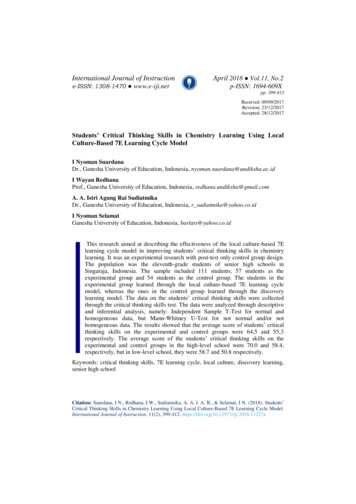Improving Children’s Outcomes
ImprovingChildren’sOutcomesDonna MolloyDirector of Dissemination, EIF@theEIFoundationeif.org.uk
What Works Centres – a culture of empirical evidenceOECD Governing better through evidence-informed policy makingImproving Children’s Outcomes@theEIFoundation eif.org.uk
The evidence for early interventionThe right intervention, at the right time, can significantly improve the life chances of many of these children& families The scientific basis for early intervention is well established, gaps in children’s wellbeing anddevelopment open up early with significant consequences for future and intergenerational outcomes. There are a range of programmes and interventions shown to improve outcomes for children But, not all early intervention is effective. Too much of what is currently delivered makes no measurabledifference Much of the work of EIF focusses on assessing the effectiveness of EI interventions to make theevidence transparent and accessibleImproving Children’s Outcomes@theEIFoundation eif.org.uk
Improving Children’s Outcomes@theEIFoundation eif.org.uk
Improving Children’s Outcomes@theEIFoundation eif.org.uk
EIF reviews include clear messages about where the evidence isstrongest and which interventions have been shown to improve childoutcomes Supporting delivery of the Troubled Families programme – 24 interventions with good evidence of improvingparent and child outcomes in vulnerable populations Improving effectiveness in child protection - good evidence to support interventions aimed at [eg] improvingattachment security in maltreated children, reducing physical abuse, reducing emotional abuse, for oldermaltreated children with trauma symptoms etc Work on tackling parental conflict concludes there are a small number of interventions shown to deliverchild outcomes EIF work on Social and Emotional Learning, shows there are programmes in schools which deliver a range ofoutcomes for childrenImproving Children’s Outcomes@theEIFoundation eif.org.uk
Reducing Parental conflictImproving Children’s Outcomes@theEIFoundation eif.org.uk
The scientific evidence that reducing parental conflict matters forchildren’s outcomes is strong, but our knowledge of what to do isstill at an early stage Some programmes that have beenfound to be effective outside the UK. Programmes generally focus on adultoutcomes, effects of coupleprogrammes on child outcomes notexplored Need to test new interventions Building the evidence base as to whatworks for whom and in whatcircumstancesImproving Children’s Outcomes@theEIFoundation eif.org.uk
Supporting children’s Social and Emotional skillsWhy do they matter?Improving Children’s OutcomesWhat Works?@theEIFoundation eif.org.uk
Making the case for evidence based SEL programmes in primaryand secondary schools Gaps in social and emotional skills openup early Clear opportunities for early interventionto improve social and emotional skillsbefore children start school & duringschool years There are programmes with goodevidence of impact on a range ofoutcomes Emerging research about key factors inthe wider school environmentImproving Children’s OutcomesDistribution of Strength of Evidenceratings for SEL Programmesprogrammes@theEIFoundation eif.org.uk
The gap between evidence and local delivery Whilst some interventions with strong evidence are available inlocal areas, these are very small in scale compared with the vast majority of practice Whilst evidence is not the only consideration in deciding what to deliver On balance - familiesand children who receive interventions shown through robust methods to improve outcomes,are more likely to benefit and to a greater degree, than those who receive other services Sustained effort is needed to: Clearly communicate the evidence Fill gaps in evidence Support analytical capacity to apply the evidence locally and to evaluate the impact of localapproachesImproving Children’s Outcomes@theEIFoundation eif.org.uk
OECD Governing better through evidence-informed policy making. . Improving effectiveness in child protection - good evidence to support interventions aimed at [eg] improving . shows there are programmes in schools which deliver a range of outcomes for children. Im
Independent Personal Pronouns Personal Pronouns in Hebrew Person, Gender, Number Singular Person, Gender, Number Plural 3ms (he, it) א ִוה 3mp (they) Sֵה ,הַָּ֫ ֵה 3fs (she, it) א O ה 3fp (they) Uֵה , הַָּ֫ ֵה 2ms (you) הָּ תַא2mp (you all) Sֶּ תַא 2fs (you) ְ תַא 2fp (you
A guide for children's centres Measuring what matters: 7 A guide for children's centres 6 1.3 The Essential Outcomes In The Institute Of Health Equity's Outcomes Framework Once children are safe and their basic health needs are met, children's centres should focus on achieving and measuring the 'essential outcomes', published in An .
The analysis from Improving quality education and children's learning outcomes and effective practices in the Eastern and Southern Africa region has similar conclusions. It reveals that as many as 40 per cent of children in school do not reach the expected basic learning benchmarks in numeracy and literacy.
Student Learning Outcomes . Purpose of Student Learning Outcomes . 1. Student learning outcomes communicate to students what they will be able to do after completing an activity, course, or program (course outcomes are specific and department/program outcomes are general). 2.
2 SPSS Statistics for better outcomes Contents 2 Introduction 3 Better outcomes for academia 4 Better outcomes for market research 5 Better outcomes for government 6 Better outcomes for healthcare 7 Better outcomes for retail 8 Conclusion Introduction IBM SPSS Statistics is a fast and powerful soluti
High Risk Groups of Children Street & working children Children of sex workers Abused, tortured and exploited children Children indulging in substance abuse Children affected by natural calamities, emergencies and man made disasters Children with disabilities Child beggars Children suffering from terminal/incurable disease Orphans, abandoned & destitute children
preterm/LBW children who were born in Rwinkwavu District Hospital (RDH) before PDC started with medical, nutritional and developmental outcomes assessed at 12-36 months of age. under way b) The general population of rural Rwandan children. This comparison will be looking at developmental outcomes of children followed in PDC
guided inquiry teaching method on the total critical thinking score and conclusion and inference of subscales. The same result was found by Fuad, Zubaidah, Mahanal, and Suarsini (2017); there was a difference in critical thinking skills among the students who were taught using the Differentiated Science Inquiry model combined with the mind























